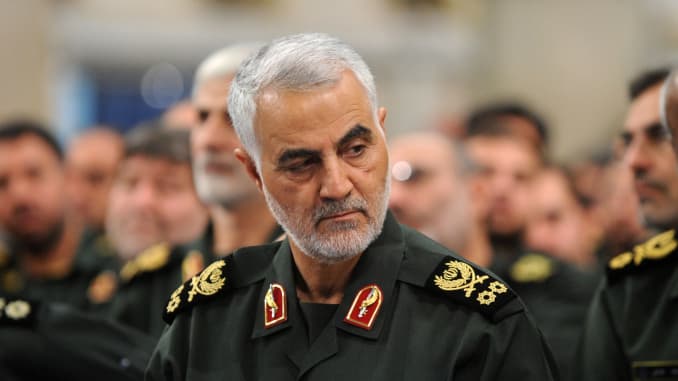
By now, you’ve certainly seen the news that Gen. Qassim Soleimani, the leader of Iran’s Quds force, and a true hardliner straight out of central casting, has been assassinated in Iraq by a United States airstrike.
In grasping for a modern historical equivalence, one comes up short. There is no way to say it other than the United States killed one of the most powerful men of a country with whom we are not at war. This was extrajudicial, almost certainly extra-legal, and extraordinarily dangerous.
That’s not to say that his end isn’t essentially fitting. This was a man who brought violence and chaos to the region, and many met far worse ends because of his manipulations and his paths of glory. In Syria, in Iraq, in Lebanon, and around the globe, people have been killed by his forces and his proxies. He was a true fanatic, and it is impossible to mourn him.
What we have to recognize, though, is what he was a fanatic for: Iranian influence throughout the region. The reversion of Iran to its typical historical glory, and its power in western and central Asia. To being the center of Middle East like it was when this was not the Middle East, but the dead goddamn center of the world.
That’s one of the reasons this is so dangerous. Soleimani was inarguably the 2nd-most powerful man in Iran. He was because he represented the reality of the Revolution. It wasn’t about Islam, exactly. It was about overthrowing Western dominance and the corrupt, West-backed Shah. As I’ve argued before:
The Iranian revolution wasn’t about Islam, or not entirely. There was a mix of anti-imperialist leftists, communists, other various secularists, religious types who didn’t want clerical rule (which remember, is what Khomeini first promised) and non-ideological nationalists who were just tired of western interference.
Western Europe and Russia had eclipsed Persian power in the region in the late 1800s, but it wasn’t until oil that the West really started controlling what was happening in Iran. Lopsided deals with venal flunkies gave England and then America a dominant role in the expropriation of Iranian resources. Shahs got rich, the west got rich, and most Iranians stayed poor. The same thing happened in Iraq, Saudi Arabia, etc.
Western colonialism in the Middle East was a 20th-century phenomenon, which in our lifetime seems like all of eternity, but was really a blip. It was a terrible one, from the perspective of the inhabitants, of course. It was dirty and condescending and venal and greedy and grubbing. It was literally crude. Khomeini wasn’t just deposing a shah for the sake of Islam: he was kicking out the west for the sake of Iran.
And that is really Soleimani’s symbolic role, or more precisely the symbolic weight of his very real actions. He was the outstretched fist or Iranian power, bending the region to Iran’s designs. He was so powerful in the country because the whole point of the Revolution was to bring that back, and he’s doing it.
None of this is to say that he was legitimately popular in Iran, as of course the government itself is deeply unpopular. And I’m certainly not going to insult you by pretending to know how “the Iranian people” will react. But this is pure American dominance and arrogance. It’s an act of slapping back Iran for daring to practice politics in the region. It will be seen as nothing more than the cruelest imperialism. This ignores, of course, that Iran politics are bloody imperialism, but we aren’t pretending that humans are rational.
The Supreme Leader will have no choice but to retaliate. Whomever takes over Quds will have every incentive o activate militias and hit US targets directly. His fiercely loyal fighters will be almost impossible to restrain. And a bungling, incredibly incompetent US government, which has systematically forced out expertise, isn’t prepared for what’s next. How could they be? They don’t know, and don’t care, what came before.
As a sort-of aside, the extra-legal part of this is pretty important domestically. There is no real justification for this under the AUMF, and if that pernicious bit of hasty paranoia is stretched to encompass the killing, it will be sad lunacy. Really, it will be the apotheosis of the AUMF, which has perverted further an already deeply-expeditionary and evangelical approach to violence. It is the culmination the last 20 years, but not an end. This is the beginning of a new and even-more dangerous phase.

